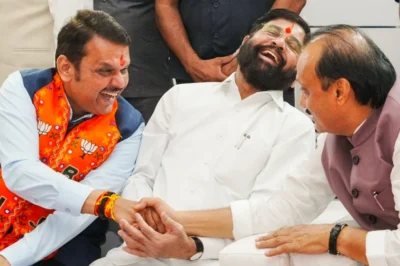The 2024 election results for Maharashtra and Jharkhand have brought significant developments, setting the stage for political shifts in both states. In Maharashtra, Devendra Fadnavis is poised to take on the Chief Minister’s role, subject to approval from the BJP leadership and its allies. Meanwhile, Eknath Shinde and Ajit Pawar are expected to assume Deputy Chief Minister posts, according to sources.
Maharashtra: Key Highlights
- Devendra Fadnavis’s Comeback:
Fadnavis, a senior BJP leader and former Chief Minister, is likely to return as the head of Maharashtra’s government. Known for his administrative acumen, his leadership is expected to bring stability and drive the BJP’s agenda in the state. - Deputy CM Roles for Shinde and Pawar:
Eknath Shinde and Ajit Pawar, significant players in Maharashtra’s political landscape, are likely to continue in influential positions as Deputy Chief Ministers. Their roles signal the continuation of the alliance dynamics that shaped the state’s governance structure leading up to the elections. - BJP’s Performance:
The BJP’s strong showing in Maharashtra cements its dominance in one of India’s most politically and economically significant states. The victory reflects effective election strategies and robust grassroots mobilization.
Jharkhand: Shifting Dynamics
While the focus remains on Maharashtra, Jharkhand’s election results have also drawn attention. The evolving political scenario suggests changes in power dynamics, with implications for governance and policy directions in the state.
Implications for Governance
- Policy Continuity in Maharashtra:
Fadnavis’s return could mean continuity in policies aimed at infrastructure development, industrial growth, and farmer welfare. His leadership is also expected to prioritize investments and economic initiatives to boost Maharashtra’s position as a key contributor to India’s GDP. - Alliance Cohesion:
The roles of Shinde and Pawar in the government highlight the balancing act within the alliance. Maintaining cohesion among coalition partners will be critical for effective governance. - Focus on Rural Development in Jharkhand:
The electoral outcome in Jharkhand underscores the need for addressing rural development, tribal welfare, and employment generation. Political leaders will need to deliver on these fronts to meet voter expectations.
Political Reactions and Public Sentiment
The results have sparked varied reactions from political leaders and the public:
- BJP leaders and supporters celebrated the party’s performance, attributing it to effective strategies and leadership.
- Opposition parties vowed to introspect and re-strategize for future elections, emphasizing their commitment to the electorate.
Public sentiment remains divided, with expectations for better governance, transparency, and development driving discussions on the results.
Challenges Ahead
While the BJP celebrates its success, challenges remain:
- Maharashtra: Managing alliance dynamics and delivering on electoral promises will be critical. Balancing urban and rural development priorities is another pressing concern.
- Jharkhand: Addressing economic disparities and ensuring inclusive development will test the government’s resolve and capabilities.
Conclusion
The 2024 election results in Maharashtra and Jharkhand mark significant milestones in India’s political landscape. As Devendra Fadnavis gears up to assume the Chief Minister’s role in Maharashtra, the focus shifts to governance and coalition management. Similarly, Jharkhand’s political shifts demand attention to development challenges. With public expectations high, the coming months will test the mettle of political leaders in both states.








Leave a Reply